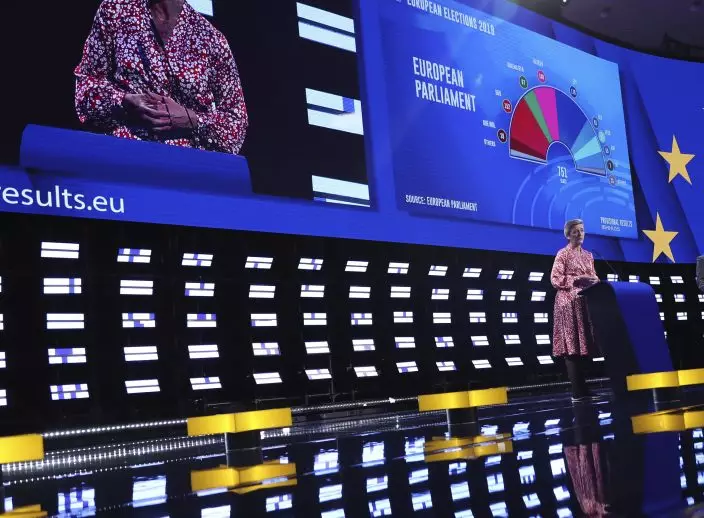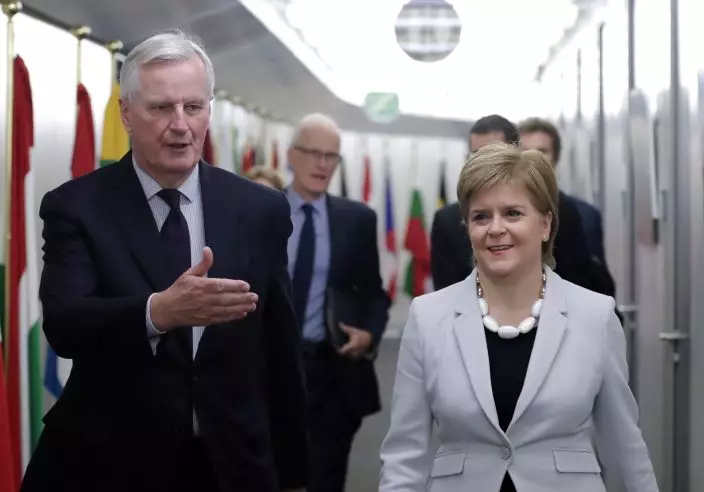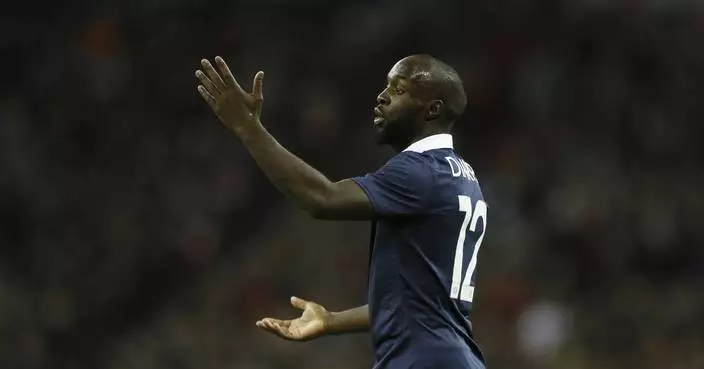EU leaders on Thursday are seeking to fill up to five key jobs supervising the 28-nation bloc's policies that will be vacated in coming months. They include the post of Council President, held by Donald Tusk; president of the powerful executive Commission, now led by Jean-Claude Juncker; president of the European Parliament; chairman of the European Central Bank and the EU foreign policy chief.
Here are some of the leading candidates for the jobs in alphabetical order. Candidates may be considered for more than one job.
Michel Barnier, France

FILE - In this file photo dated Monday, May 27, 2019, Denmark's Margrethe Vestager, speaks at the European Parliament in Brussels. In recent years Competition Commissioner Margrethe Vestager has ramped up enforcement efforts on tech giants, but has also declared that stronger consumer protection rules would have a big role in protecting consumers. (AP PhotoFrancisco Seco, FILE)
Barnier, a 68-year-old Frenchman, has used a lifetime of diplomatic acumen to keep 27 EU nations together as they faced off with Britain over the Brexit divorce negotiations. From the Savoie area, Barnier was responsible for organizing the 1992 Albertville Winter Olympic Games before plunging fulltime into politics. He was France's European affairs, farm, fisheries and foreign ministers before becoming commission vice president. Yet because of the timing of the Brexit talks, he has not publicly campaigned for a new EU job.
Josep Borrell, Spain
Borrell, the minister for foreign affairs, is being touted as a possible EU foreign policy chief or a commission vice president. The 72-year-old socialist was minister of finance and the economy and held other senior Spanish posts during the 1980s. Elected to the European Parliament in 2004, he was its president for five years.

Dutch Prime Minister Mark Rutte arrives for an EU summit at the Europa building in Brussels, Thursday, June 20, 2019. European Union leaders meet in Brussels for a two-day summit to begin the process of finalizing candidates for the bloc's top jobs. (Julien Warnand, Pool Photo via AP)
Ska Keller, Germany
Franziska Maria "Ska" Keller is president of the Greens/EFA group in the European Parliament and a candidate for the parliament presidency. The 37-year-old was born in what was then communist East Germany and has been a member of European Parliament since 2009. She is known for her commitment to fighting corruption and she also backs fair trade policies, welcoming refugees and ensuring legal migration is possible.
Dalia Grybauskaite, Lithuania

European Union chief Brexit negotiator Michel Barnier, left, speaks with Scotland's First Minister Nicola Sturgeon prior to a meeting at EU headquarters in Brussels Tuesday, June 11, 2019. (Olivier Hoslet, Pool Photo via AP)
The 63-year-old former EU budget commissioner has served two consecutive terms as Lithuania's president — the first woman to do so. A political independent, Grybauskaite took office in 2009 when public anger over the economic downturn spilled into the streets with violent riots. Nicknamed Steel Magnolia for her tough stance on corruption and Russia, she has lobbied hard to free Lithuania from dependency on Gazprom energy supplies. Grybauskaite has been one of loudest advocates for NATO to prepare defense plans for the Baltic states.
Stefan Lofven, Sweden
Lofven has been Sweden's prime minister since 2014, two years after becoming the Social Democratic leader. In January, the 61-year-old skilled negotiator presented a two-party, center-left minority government. Lofven was at the helm when Sweden took in a record number of migrants from the Middle East and Africa in 2015 on top of the hundreds of thousands admitted before. He tightened immigration laws in a country that prides itself on welcoming migrants and refugees.
Angela Merkel, Germany
Merkel, Germany's chancellor since 2005, is said to be a candidate for Council president. Germany's first female leader has said she does not plan to run again after her term ends in 2020. She was a central figure in European efforts to tame the Greek debt crisis, and won widespread praise — plus much criticism — for welcoming refugees in 2015. Merkel, who turns 65 next month, is a trained scientist but has been in politics with the Christian Democratic Union for decades.
Mark Rutte, Netherlands
Rutte is a three-term Dutch prime minister known for his bridge-building skills developed over years of forging coalitions in the Netherlands.
A former human resources executive at Anglo-Dutch multinational Unilever, Rutte is a member of the pro-business Dutch People's Party for Freedom and Democracy who has steered the party to the right. He is pro-EU but wants the bloc reformed so it can focus on tackling major cross-border issues such as climate change and migration. Rutte has said previously he is not interested in a top EU job, but that has not dampened speculation.
Frans Timmermans, Netherlands
Timmermans is a former Dutch foreign minister who speaks several languages and has been the first vicepresident of the commission since 2014. He has wide experience in Europe, having been a Dutch minister for European affairs. The Labor Party politician earned respect at home in the aftermath of the shooting down of a Malaysia Airlines flight over Ukraine in July 2014 when he made a angry speech at the United Nations, saying the loss of nearly 200 Dutch citizens "left a hole in the heart of the Dutch nation."
Margrethe Vestager, Denmark
Vestager, the EU's competition chief since 2014, is being touted as a possible commission president. A former Danish deputy prime minister and economy minister, Vestager, 51, is best known for making headlines by repeatedly slapping heavy fines on big tech companies. She was elected to Denmark's Parliament in 2001 and became in 2007 the political leader of Denmark's Social Liberal Party for seven years.
Manfred Weber, Germany
The 46-year-old Bavarian is a member of the conservative Christian Social Union party in Germany, the partner of Chancellor Angela Merkel's Christian Democratic Union. He's the European People's Party candidate for commission president. Weber has been endorsed by Merkel but has struggled in campaigning, weakened by EPP losses in last month's EU elections. Weber has warned populists that they have no place in the European Parliament's largest political group unless they share its vision of an "integrated and more ambitious Europe."










